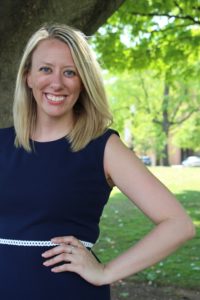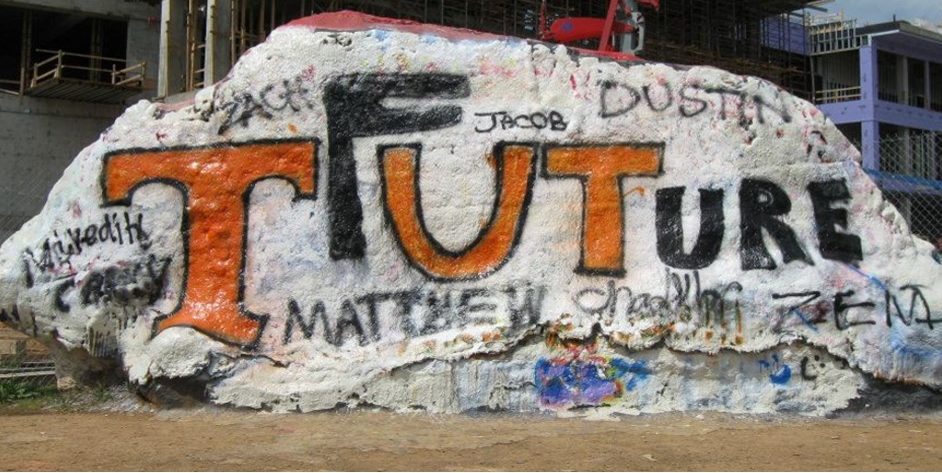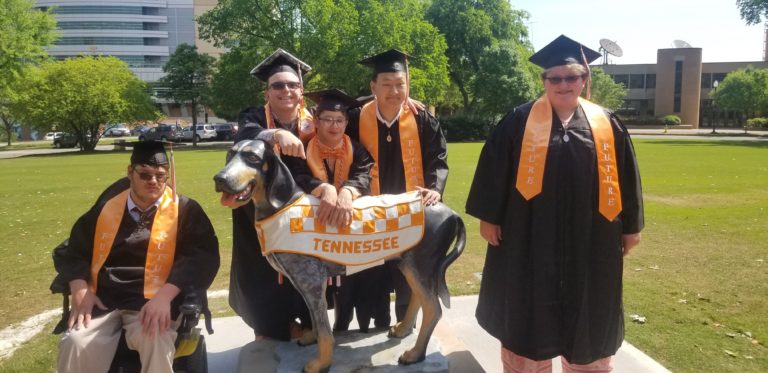Written by Joan Grim, senior lecturer in special education
 It was a week before she defended her dissertation in 2017 that Emma Burgin was recruited to become the director of the University of Tennessee, Knoxville’s FUTURE program. FUTURE is an undergraduate program specially designed for individuals who have intellectual and/or developmental disabilities (IDD). Since its inception, the program has grown into a campus wide success story in which students with developmental disabilities live, work, socialize, and attend classes on campus. Through its design and culture, FUTURE students are full members of the campus community. Joan Grim interviewed Burgin to learn more about her accomplishments and future plans for the program.
It was a week before she defended her dissertation in 2017 that Emma Burgin was recruited to become the director of the University of Tennessee, Knoxville’s FUTURE program. FUTURE is an undergraduate program specially designed for individuals who have intellectual and/or developmental disabilities (IDD). Since its inception, the program has grown into a campus wide success story in which students with developmental disabilities live, work, socialize, and attend classes on campus. Through its design and culture, FUTURE students are full members of the campus community. Joan Grim interviewed Burgin to learn more about her accomplishments and future plans for the program.
Tell us a little about the UT FUTURE Program’s mission and goals. How did you become involved in FUTURE?
Emma: The FUTURE Program empowers its students, all of whom have an intellectual or developmental disability, to become contributing members of our community. They do this through their work, sure, but also through their service, engagement, socializing, etc. The field of inclusive post-secondary education is meant to ensure these individuals have the best opportunity to improve their own quality of life.
I became involved in FUTURE when I first came to UT as a doctoral student in the counselor education program. I worked as the internship coordinator and transition specialist. The week before I defended my dissertation, my chair told me the head of the program was leaving, and asked me if I wanted to interview for the job. I took over in fall 2017 and we have been growing in so many directions ever since.
Since beginning your role as FUTURE director, what has inspired you to reach out into the UT & broader communities to build the program?
Emma: I think it is not just the FUTURE Program’s job to create a campus community where differently abled learners can thrive – that is the job of the university as a whole. I am simply calling on the university community to do as they say, which is create a place where diversity and inclusion are welcome and valued.
The true inspiration is seeing what the FUTURE students are capable of and watching them pursue opportunities for themselves. I would love to say I open doors for them, but the reality is they do most of the work themselves. We have about three students involved in student government, one serving as the assistant communications director. Other students have been involved in club sports teams and campus dance troupes. And Best Buddies UT blazed the way for our students to participate in every single Homecoming event last fall – even winning the Smokey’s Howl dance competition.
How can I not fight for them every chance I get? There are still many doors and, more importantly, many minds closed to them here on campus. I intend to be at the frontlines of changing that.
What kinds of experiences have you designed for the FUTURE students?
Emma: Well, again, many of the experiences are designed by the FUTURE students themselves. However, we do try and make sure they are connected as FUTURE family from the moment they are admitted and long after. Perhaps our most beloved experience is Fun Fridays. Each Friday afternoon during the school year, we participate in a group activity – FUTURE students and mentors – that gives us exposure to the university and surrounding community. For example, before classes moved online this semester, we visited Kappa Kappa Gamma for a Valentine’s Day party, learned dances from Boss Dance Troupe, went wall climbing at the UT RecSports facilities (TRECS), and visited SPARK, a nonprofit that connects people with disabilities to assistive technology.
The internships also are a huge part of the program that my students will miss out on during this switch to online classes. These trial work experiences give FUTURE students the opportunity to learn and apply real-time skills in the world of work. We partner with sites such as UT president Randy Boyd’s office, Thornton Student Athletics Student Life Center, VolDining, Mobile Meals, Knoxville Community Television, 90.3 The Rock, among many others. They help solidify the vocational certificate the FUTURE students earn from the College of Education, Health, and Human Sciences.
Tell us about the student mentor program and the important role of UT students as mentors.
Emma: The peer mentors, anywhere from 60 to 100 undergraduate and graduate students, are the backbone of our program. They provide the one-on-one support to the FUTURE students they need to be successful in college classes and internships. Our mentors can work as in-class supports, teaching assistants for FUTURE classes, workout buddies, lunch buddies, and job coaches.
The FUTURE program is providing unique and valuable experience to these students, offering them a chance to work very closely with young adults with intellectual and/or developmental disabilities. There are not a lot of opportunities for training with this age group. Additionally, we are creating future leaders for inclusive post-secondary programs through their work as peer mentors.
Can you share a story about the impact of the program?
Emma: At FUTURE, we try to really listen to what students and families are trying to achieve. Sometimes this means recognizing when FUTURE isn’t a good fit. However, I do consider the FUTURE family to include any person and family in our area living with a disability. When one young man applied to the program last year, he was at the top of our list for admission but we kept hesitating. It was because we felt he was already job ready, without having to attend FUTURE and put a financial burden on his family. I worked with the UT Sustainability office to secure this young man a full-time job with benefits because I felt it was what was best for him, even if it meant he never attended FUTURE.
That is the impact of this program. I make sure we all listen and individualize the program to make sure any person with a disability that enters our orbit is empowered in some way.
What is your proudest accomplishment in the FUTURE program?
Emma: My proudest accomplishment so far, which was not simply mine but the result of many individuals’ efforts, was implementing a residential program for FUTURE students here at UT. We are in the first year of the pilot program – which again has been impacted by COVID-19 and, up until our students having to move out due to the virus, things had been going well. So well, in fact, that we just approved our second group of students to live on campus during the 2020-21 academic year. I hope growth in this area of the program will allow us to recruit more and more students – both in the area and outside of it – and provide them with the best opportunity to learn independent living skills and improve their overall quality of life.
What are some upcoming programs that you have planned?
Emma: We are in the middle of our admissions process right now – on hold due to COVID-19 – but we had more than twenty applicants. That’s the most we have ever had! We recruit year-round throughout East Tennessee. We choose a select group to come on campus and meet with our large admissions committee, made up of stakeholders from all over the university (e.g., instructors, internship supervisors, student services staff, etc.). The prospective students sit through half-day interviews – it’s a big deal and an exciting time for the program.
We also typically throw an end-of-the-year banquet for our students where we recognize our graduates and they receive their diplomas. We co-host this with Best Buddies UT, a student organization that works closely with FUTURE; however, it’s been postponed due to COVID-19 as well. But I fully intend to hold this event as soon as we are allowed back on campus and to make sure our 2020 graduates can walk across the stage at graduation in December. The recognition for their accomplishments and their visibility on campus are both really important to past, present, and future FUTURE students.
Other things we are working on include working with UT’s Orientation office to find new ways to include our students in campus activities from the moment they are admitted. We also have been diligently working with student leaders to create a disability council and with Chancellor Donde Plowman to establish a Commission on Disability for the University. All of these efforts are aimed toward amplifying the message of diversity and inclusion here at the University of Tennessee, Knoxville.


